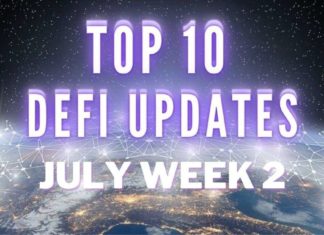Blockchain networks get praise for their transparency. And we like that. But you don’t want your national ID number out there on-chain for anyone to see or use to steal your identity right?
Because public transparency has its limits. And if you want to limit how much of your public information others can see and access on-chain, then today’s project is for you. Meet this sleeping giant: DOP and its selective transparency protocol.
What is Selective Transparency?
Blockchains are public. At least the good ones are. So we’ve been conditioned to think blockchain privacy is only an all-or-nothing game. It has to be not private at all like Bitcoin or Ethereum. Or completely 100% private like Secret Network or Aleph Zero.
But that’s not true. DOP, which stands for Data Ownership Protocol, gives you an idea of where they stand just by the name. They want YOU to own and control your data. You can see in the background DOP is talking about how shielding some of your data will help crypto go mainstream.
But they have this selective transparency thing. So what is that? DOP offers the chance for you to decide what, when, and how much of your data you expose to the public. So it’s not all or nothing. Real privacy moves on a sliding scale. Sometimes it matters a lot.
If you are paying a bill online, or maybe something that costs more than $1000, then maybe you don’t want others to see that info. But then smaller transactions of sending $50 to a friend or buying a small free minted NFT, you may not care as much who sees it. There are lots of advantages to this method.
The biggest advantage, by far, is that it’s less of a hassle dealing with local regulations worldwide. Many jurisdictions becoming hostile to crypto now. And some of these same jurisdictions have the “guilty until proven innocent” stance even if they say they believe otherwise.
With that in mind, it means platforms like Secret have a target on their back from these regulators and jurisdictions. And while we are against these types of policies, it’s also foolish to ignore them when you know they are out there. Since DOP lets YOU select what to reveal, the responsibility falls to you. And if a regulator asks the DOP dev team about you, that’s what they will say.
(1/6) At DOP, we're committed to preparing the ground for mass adoption by bringing data ownership to Ethereum. But we know we can't go mainstream without fighting illicit activity. 🧵below:
— Data Ownership Protocol (@dop_org) November 20, 2023
Data Ownership vs Privacy
We already see that with DOP, the level of privacy you choose is on a sliding scale. You get to decide.
But there are some important distinctions too. Privacy coins are a relatively small part of the market at $6 billion. The previously mentioned regulations are just one of a few reasons why. The biggest coin is Monero at #27 by market value. But DOP is building on top of Ethereum. The EVM market is huge at over $365 billion. It’s 60x larger!!
So maintaining data ownership down at the user level where you control it, but within the EVM ecosystem can be MUCH more impactful. You are revealing your information much less often on the most popular platforms in crypto. Other advantages include:
- Zero-knowledge-based KYC if your app needs to KYC customers.
- Customized data disclosures.
- Showing full data ownership on Ethereum for the first time.
So you can see that while privacy is a great goal. Full 100% privacy Secret-style might be more limiting than we’d prefer. DOP’s approach broadens the possibility of you only disclosing this info when you want to even when using the most popular ETH protocols.
Do you use any privacy protocols now? If so, which one is your favorite? Let us know in the comments below.
Thank you @Binance for a wonderful event!
We had a great time at #BinanceBlockchainWeek sharing our vision, showcasing our technology and taking a step closer to true Data Ownership. A big shout out to our amazing community!
It was wonderful seeing you. Can't wait till next… pic.twitter.com/3E2Dr2k2DX— Data Ownership Protocol (@dop_org) November 10, 2023
The Future of ETH Apps & Protocols
I’m sure you’ve seen the term account abstraction around. It’s confusing and it means a couple of different things.
It’s supposed to make using Ethereum safer and better. The creation of a “smart account” lets you do the things you want to do like connect to a DeFi app but in an easier way than we do now by:
- Connecting.
- Approve interaction with the smart contract.
- Approve the transaction.
- And Signing multiple times.
This shift from Externally Owned Accounts (which is doing it the old way) to this new, faster, safer way is the future of all Ethereum apps and protocols. This new way of using account abstraction allows DOP to offer you flexibility in how private your account is.
Basic human rights like control of your financial data are at risk in the crypto space, and DOP is here to protect it. Our new article explores how DOP allows for the confidentiality users deserve.
Read more: https://t.co/Xembm5il1V pic.twitter.com/L6WHrVpiEH— Data Ownership Protocol (@dop_org) November 13, 2023
At the network level, meaning on Ethereum, your account details will now be invisible. So ETH can’t tell who you are. They can only see the smart contract you interact with. So at the user level, which is us, those things are hidden. We now have more options for deciding who sees what instead of the full transparency of a working public blockchain.
Conclusion
It means wallets and apps are easier to work with AND our control over our data will increase. Without account abstraction, it’s hard to make privacy work unless you make everything private like a Secret Network. And the idea of you being in control of your data disclosures would be non-existent.
Account abstraction is the future of ETH apps. And you can see how it will work in real life with one of the first apps to implement it. Stay tuned out there as the testnet is coming soon so you can try it out for yourself.
Disclaimer
The information discussed by Altcoin Buzz is not financial advice. This is for educational, entertainment, and informational purposes only. Any information or strategies are thoughts and opinions relevant to the accepted levels of risk tolerance of the writer/reviewers and their risk tolerance may be different than yours. We are not responsible for any losses that you may incur as a result of any investments directly or indirectly related to the information provided. Bitcoin and other cryptocurrencies are high-risk investments so please do your due diligence. This article has been sponsored by DOP. Copyright Altcoin Buzz Pte Ltd.





























